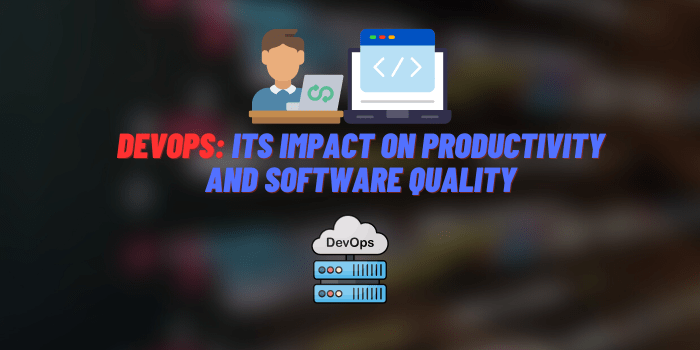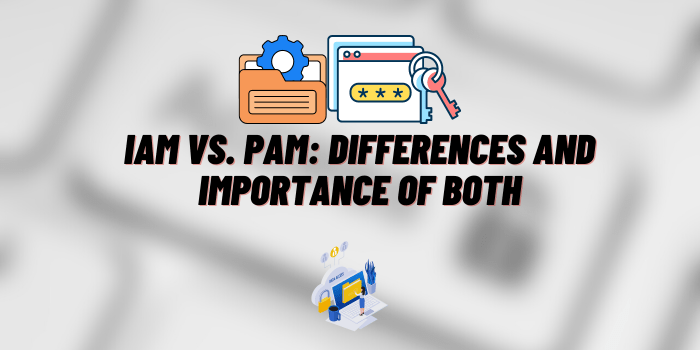DevOps: Its Impact on Productivity and Software Quality
DevOps is a practice in the world of software development that has significantly changed how we build and deliver software. It’s a technique that encourages teamwork, leading to quicker results, better-quality software, and happier customers.
Over the past few years, DevOps has become a key player in software development. Major tech companies, like Amazon, Netflix, and Google, use DevOps to speed up their work, create better products, and stay ahead in the world of technology.
However, despite its popularity, some people may not fully understand the importance and impact of DevOps. This article aims to explain what DevOps is, how it’s changing software development, and why it might be a crucial element for successful software companies today.
By learning about DevOps, we can better understand its benefits, its challenges, and its potential for the future. We’ll be taking a look at real-world examples, hearing from experts, and analyzing how DevOps is reshaping software development.
Whether you’re studying computer science, managing a project, or leading a tech company, understanding DevOps can be beneficial. So, let’s begin our exploration of DevOps and its role in transforming software development.
What is DevOps?

DevOps is a term we get from joining “Development” and “Operations.” It’s a way of working that makes creating software better and faster. DevOps is a special kind of software development lifecycle.
In this DevOps lifecycle, the people who create the software (developers) work closely with the people who ensure the software runs smoothly (operations). This way, they can share ideas, solve problems faster, and ready the software for people to use in less time. Thus, DevOps is a supercharged development lifecycle that enhances the entire software development process.
History of DevOps
DevOps didn’t always exist. Back in the day, the people who created software (developers) and those who ensured it worked smoothly for users (operations team) were separate groups. Sometimes, this causes problems. Developers might create new software features without fully considering how they would operate in the real world, leading to software issues and delays.
Around 2009, this started to change. The concept of DevOps began to take shape. The goal was to bring developers, operations, and security teams closer. Working more closely could prevent many problems, ensuring better software and happier users.
DevOps Principles
The philosophy of DevOps is built around several fundamental principles. Let’s expand on the following:
1. Automation
In the DevOps approach, automation plays a crucial role. It involves using technology to carry out routine tasks. For instance, you can automate testing code, deploying updates, and managing systems. Automation ensures precision and frees up time, allowing teams to focus on more complex, creative tasks that can’t be automated.
2. Continuous Delivery
Continuous delivery is another cornerstone principle of DevOps. It’s all about making minor, frequent updates to the software instead of significant changes simultaneously. This approach makes it easier to spot and fix any issues that may come up, ensuring more stable and reliable software for users.
3. Collaboration
The development and operations teams work separately in a traditional software development setup. DevOps, however, encourage these teams to work together. This collaborative approach underpins the effectiveness of DevOps, enhancing overall development process efficiency.
4. Shared Responsibility
Another fundamental principle of DevOps is shared responsibility. In this DevOps model, every team member is responsible for the success of the software, including its quality and reliability. It means developers are also accountable for the operations, and the operations teams are involved in the development process, fostering an environment of shared ownership.
5. Monitoring and Learning
DevOps also emphasizes the importance of monitoring software performance and learning from it. This principle allows teams to understand how changes affect the software and learn from these insights to improve future updates.
The Role of DevOps in Software Development

DevOps has an integral role in the dynamic world of software development. Its implementation brings profound changes, transforming how DevOps teams work together. DevOps fosters a more efficient and synergistic software development process by fusing the strengths of these two traditionally separate teams. Let’s explore how DevOps shapes this process and what roles it assumes:
Bridging the Gap
DevOps is crucial in eliminating the barriers between developers and operations teams. They work together as a unit, leading to a more streamlined process.
Ensuring Quality
By promoting practices like automation and continuous delivery, DevOps helps maintain software quality.
Accelerating Development
DevOps accelerates the software development process. Due to its efficient practices, you can add new features swiftly and reliably.
Quick Problem Resolution
This proactive strategy fosters a seamless user experience by promptly addressing issues or bugs in the software. DevOps ensures swift identification and resolution of software issues by fostering close collaboration between teams and implementing continuous monitoring and feedback.
So, DevOps is a fundamental approach in modern software development, leading to efficient processes, quality software, and satisfied users.
Impact of DevOps on Productivity

DevOps is a powerful tool in software development that enhances productivity, which means creating better software more quickly and accurately. This approach merges the DevOps teams, facilitating a more streamlined workflow in software creation.
Streamlined DevOps Workflows and Automation
The traditional software development process often had steps like design, coding, testing, and deployment occur one after the other, leading to delays and errors. DevOps changes this approach by enabling these steps to occur more concurrently, resulting in a smoother and quicker process.
Moreover, DevOps also introduces automation, a method of using technology to perform repetitive tasks. For instance, a software application must be tested in several ways. Instead of doing this manually, which is time-consuming and error-prone, automation tools in DevOps can do it much faster and without mistakes.
Enhanced Collaboration and Communication
Better collaboration and communication are core principles of DevOps. In older methods, developers and operations teams worked in isolation, often leading to miscommunication. DevOps brings these two groups together and encourages regular dialogue. Improved communication leads to faster resolution of issues, more efficient decision-making, and a better understanding of the software development project. For instance, if a developer is still determining how a new software feature should operate, they can directly consult the operations team, saving valuable time and effort.
Indeed, DevOps plays a crucial role in enhancing productivity in software development. DevOps optimizes software creation by introducing streamlined workflows, automation, and better collaboration and communication, benefiting the software team and the end users.
DevOps and Software Quality
DevOps significantly improves the quality of software. It incorporates various practices and DevOps tools to create robust, reliable, and user-friendly software.
How DevOps Ensures Better Quality Software
DevOps enhances software quality through several practices, such as:
1. Continuous Testing
Continuous testing involves running tests at every stage of the software development process. Unlike traditional testing, which usually happens at the end, continuous testing allows developers to identify and fix issues as soon as they appear. This results in a product with fewer bugs and higher quality.
2. Infrastructure as Code (IaC)
IaC is a method that uses coding to manage and set up the different technical parts of a software project, like servers and databases. It also encompasses configuration management, a critical aspect that ensures each system component is recorded and updated to maintain a consistent state. This setup ensures that the infrastructure and its configuration are repeatable and consistent, reducing the chance of errors that could impact software quality.
3. Version Control Systems
Version Control Systems are an essential DevOps aspect that contributes to software quality. These systems keep track of all the changes made to the code, allowing developers to revert to previous versions if something goes wrong. This system minimizes the impact of bugs introduced into the software, improving overall quality.
The Role of Continuous Integration and Continuous Deployment (CI/CD) in DevOps

CI/CD is a crucial part of DevOps, playing a significant role in ensuring software quality.
1. Understanding CI/CD
Continuous Integration involves regularly merging code changes into a shared repository, allowing developers to detect and fix issues early. Continuous Deployment extends this practice by automatically deploying the code changes to the production environment after they are tested and approved.
2. How CI/CD Contributes to Software Quality
CI/CD contributes to software quality by constantly updating the software with the latest features and fixes. This continuous update reduces the time between identifying an issue or opportunity for improvement and implementing the necessary changes.
3. Case Study: The Impact of CI/CD on Software Quality
A study by Puppet Labs found that companies that use CI/CD have a 25% lower rate of bugs in production than companies that do not use CI/CD. The study also found companies that use CI/CD can release new features 30% faster than companies that do not use CI/CD.
Hence, using continuous testing, infrastructure as code, version control systems, and CI/CD, DevOps, with its practices and tools, ensures early identification and resolution of issues, maintaining the software’s quality and reliability.
Selecting a DevOps-Driven Software Development Partner
Choosing a suitable software development partner is a critical decision for any organization. One factor that can significantly impact the quality of the partnership and the resulting software is the adoption of DevOps practices by the software development partner.
Why a DevOps Culture is Crucial in Your Software Development Partner
A DevOps culture in your software development partner is crucial because it enhances efficiency and quality in software development. DevOps combines development and operations processes, promoting a culture of collaboration, continuous improvement, and shared responsibility. These elements contribute to faster, more efficient software development with fewer errors, ultimately producing high-quality software.
Things to Look for in a DevOps-oriented Software Development Company
When searching for a DevOps-oriented software development partner, here are several vital elements to consider:
1. Practical Experience and Demonstrated Expertise in Implementing CI/CD
The company should have proven experience in implementing Continuous Integration and Continuous Deployment. These practices ensure frequent and reliable software releases.
2. Proven Track Record
A good DevOps-oriented software development company will have a history of successful projects. These should demonstrate their ability to deliver quality software efficiently.
3. Emphasis on Automation
Automation is a core principle of DevOps. It increases speed and reduces errors in processes like testing and deployment. A good partner will utilize automation wherever possible.
4. Cultural Fit
A successful partnership also depends on the alignment of cultures and values. The partner company should value collaboration, transparency, and continuous learning—critical components of a DevOps culture.
5. Training and Knowledge-Sharing Capabilities
One crucial element to look for in a DevOps-oriented software development company is its training and knowledge-sharing capabilities. The company should commit to ongoing learning and be able to share their knowledge with your team. It enables your organization to understand and maintain the DevOps practices they have implemented.
6. Adaptability
DevOps is all about being flexible and responsive to changes, so an excellent DevOps-oriented software development company should demonstrate adaptability. Whether it’s adjusting to new project requirements or keeping up with the latest tech trends and DevOps practices, they should be capable of adapting and responding effectively to change. This adaptability ensures that they can handle whatever challenges your project might present.
How to Ensure Smooth Collaboration with Development and Operations Teams

Ensuring smooth collaboration with development teams is essential for successful software development. Here are some ways to foster that collaboration:
1. Clear Communication
Clear, open, and regular communication ensures everyone aligns on goals, expectations, and responsibilities. It also facilitates the quick resolution of any issues.
2. Shared Responsibilities
In a DevOps culture, development and operations teams share responsibilities. This shared ownership fosters collaboration and enhances the quality of the end product.
3. Regular Feedback and Reviews
Regular feedback and reviews help identify areas of improvement and celebrate successes, fostering continuous improvement.
4. Understanding and Respecting Each Other’s Expertise
Each team brings unique skills and expertise. Recognizing and respecting this expertise promotes a collaborative environment where each team feels valued and heard.
Selecting a DevOps-driven software development partner can significantly enhance the software development process and product quality. Choosing a partner that embraces a DevOps culture, has a proven track record, emphasizes automation, and fits well with your organizational culture is essential.
Conclusion
DevOps combines software development and IT operations for improved efficiency and quality. And DevOps practices contribute to better software. The utilization of CI/CD ensures timely and reliable software releases. Moreover, adopting a DevOps culture in a software development partner can significantly improve the outcome of your software projects.
You can expect a productivity boost and software quality enhancement by embracing DevOps. If you’re ready to experience the benefits of DevOps, consider partnering with a software development company that values these practices.
Are you interested in taking your software development process to the next level with DevOps? Contact BIT Studios or explore our QA and software testing services for more information!






